One of MC’s Materialities is “Addressing Regional Issues and Growing Together with Local Communities,” through which MC strives to contribute to regional development through its business and corporate philanthropy initiatives and grow together with the regions and communities where it operates.
In identifying "Addressing Regional Issues and Growing Together with Local Communities" as one of its Materialities, MC recognizes the value of building relationships with communities for the success of its businesses. Furthermore, by growing together with communities through job creation, promoting community development and procuring raw materials from local communities, MC also strives to minimize negative impacts. Growing together with local communities is equally as important as advancing MC’s businesses and generating financial return. This represents the true spirit of MC, which seeks to simultaneously generate economic, environmental, and societal value.
MC appreciates that local employment and procurement have an important role to play in building positive relationships with and contributing to the sustainable development of the countries and regions in which it operates (as outlined in ISO26000, etc.). MC understands that hiring employees and procuring goods and services from the local areas near to project operations contributes to the sustainable development of the region through local human resource development and through social and economic growth. As a company with business operations in many countries and regions across the globe, MC will endeavor to make economic contributions through its business by way of local employment and procurement, as well as social contributions through various philanthropic efforts, with the aim of growing together with local communities.
MC believes in the importance of minimizing impact on the environment and society when carrying out decommissioning for mining and for oil and gas projects. When carrying out these projects, in order to ensure that measures for future decommissioning are undertaken smoothly and appropriately, MC will, from initial project planning through to operation, carry out environmental impact assessments in accordance with the laws of the countries and regions in which it operates as well as with international principles*The ICMM (International Council on Mining & Metals) 10 Principles, etc.*. In addition, MC will engage in dialogue with governments, local communities and other stakeholders in order to develop appropriate decommissioning plans and implement necessary measures such as rehabilitation in order to minimize impact on the environment and communities.
| Officers in Charge | Kenji Kobayashi (Senior Vice President, Corporate Functional Officer, CSEO) |
|---|---|
| Deliberative Body (A subcommittee under the Executive Committee, a management decisionmaking body) |
Sustainability Committee Important matters related to communities deliberated by the Sustainability Committee are formally approved by the Executive Committee and put forward or reported to the Board of Directors based on prescribed standards. |
| Departments in Charge | Sustainability Dept. |
When reviewing and making decisions on loan and investment proposals, MC not only takes economic factors into consideration, but also places importance on ESG as well. We also take into account revitalization of the local society and economy, the status of the surroundings such as indigenous people and cultural assets, and related factors. Besides screening new investment and exit proposals, MC also strives to make improvements to existing business investments by monitoring their management practices.
In keeping with our belief that MC’s sustainable growth cannot be achieved without realizing a sustainable society, we address our Materiality through both business and philanthropic activities. MC engages in philanthropic activities that are in line with three overarching themes: “Realizing an Inclusive Society,” “Empowering the Next Generation” and “Conserving the Environment.” In addition, MC also provides support for regions affected by natural disasters, which includes recovery efforts for the Great East Japan Earthquake.
Each of our philanthropic activities is conducted with a focus on long-running initiatives in which our employees can voluntarily take part and which highlight and respect the unique strengths of our company. These contribute to MC’s overall pursuit of businesses that generate value for societies.
MC places great emphasis on deepening employee awareness of the importance of giving back to society. We therefore have taken steps to encourage employee participation in volunteer activities, for example, by establishing a volunteer leave system and by holding in-house volunteer programs during lunch hours. In addition, MC launched a series of relief activities in the immediate aftermath of the Great East Japan Earthquake in 2011, and as of March 31, 2021, a total of 4,958 employees had participated in those activities as volunteers.
Please refer to the link below for details of the program.
| Foundations and Funds | Activities | Year of Establishment and Paid-in Capital (Cumulative) |
|---|---|---|
| Mitsubishi Corporation Disaster Relief Foundation |
The Mitsubishi Corporation Disaster Relief Foundation promotes recovery activities in areas affected by the Great East Japan Earthquake through provision of scholarships and grants, as well as industry revitalization and job creation. | Established in 2012 Approximately JPY13.5 billion (Including donations through the Mitsubishi Corporation East Japan Earthquake Recovery Fund) |
| Mitsubishi Corporation Foundation for the Americas(MCFA) | To contribute to realizing an inclusive society, empowering the next generation, and conserving the environment by addressing environmental and social issues in the Americas. | Established in 1991 Approximately USD14 million |
| Mitsubishi Corporation Foundation for EMEA(MCF for EMEA) | To contribute to realizing an inclusive society, empowering the next generation, and conserving the environment by addressing environmental and social issues in EMEA. | Established in 1992 as Mitsubishi Corporation Fund for Europe and Africa Changed the name to Mitsubishi Corporation Foundation for EMEA in 2024 Approximately GBP6.45 million |
Please refer to the link below for details of the program.
Through the Mitsubishi Corporation Foundation for the Americas (MCFA) and the Mitsubishi Corporation Foundation for EMEA(MCF for EMEA), MC supports supports organizations that are addressing environmental and social issues in the Americas and in the EMEA region with the aim of realizing an inclusive society, empowering the next generation, and conserving the environment. Since its establishment in 1991, the MCFA has donated approximately USD14 million. One example is the Amazon Waters Initiative led by US-based Wildlife Conservation Society (WCS), through which grants from the MCFA have improvemed fisheries and strengthened wildlife habitat management and monitoring in the Amazon River basin, and have also supported climate change-related research activities. The Mitsubishi Corporation Fund for Europe and Africa (MCFEA), which was established in 1992, changed its name to the Mitsubishi Corporation Foundation for EMEA in 2024 to support philanthropic activities in the EMEA region. Both of these organizations have donated approximately GBP 6.4 million to date.The MCF for EMEA has supported non-profit entities such as the African Leadership Academy which provides an educational program for youth to nurture future leaders in Africa, and Farm Africa which contributes to improving biodiversity and livelihoods of local communuties in Ethiopia.
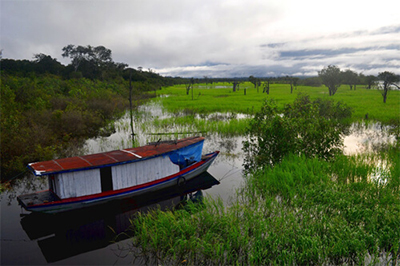
For further details, please refer to MC's Corporate Philanthropy website.
Please refer to the link below for details of the program.
MC is exploring an urban management project and promoting a large-scale urban development project in collaboration with Sinar Mas Land (SML), one of the largest real estate developers in Indonesia.
MC signed an MOU with SML in March 2020, initiating a joint execution of urban management as well as the implementation of smart and digital solutions (urban services) in BSD City (6,000 hectares). This partnership between MC and SML aims to implement urban services throughout BSD City, including an AI/IoT data platform, city portal, mobility, and energy-related content, in collaboration with various MC Group companies and partners across different business sectors.
After the signing of the MOU, we initiated the first trial operation of autonomous electric vehicles (AEVs) in Indonesia, followed by the sharing service experiment designed to promote a shift in behaviour from “owning” to ”renting”. Furthermore, we have recently embarked on another experiment involving a mobile convenience store operated by electric vehicle. Through these initiatives, we have been actively exploring different city service experiments and implementations aimed at addressing social issues while promoting city sustainability.
At the same time, in the same city, MC is working with SML on a large-scale development. This project is the first transit-oriented development*Urban development based on public transit, aiming for a society that is not dependent on automobiles.* in Indonesia, and it will develop a smart city that combines urban functions such as residential units, commercial properties, schools, hospitals, parks, and public transportation nodes on a new development site of over 100 hectares.
By encouraging a modal shift towards expanding and promoting the use of public transport, we aim to contribute not only to the economy, but also to society and the environment by helping to address issues such as traffic congestion and air pollution. Another goal is to create convenient, safe, and secure urban developments through the implementation of urban services such as AI/IoT data platform, city portal, mobility, and energy-related content.
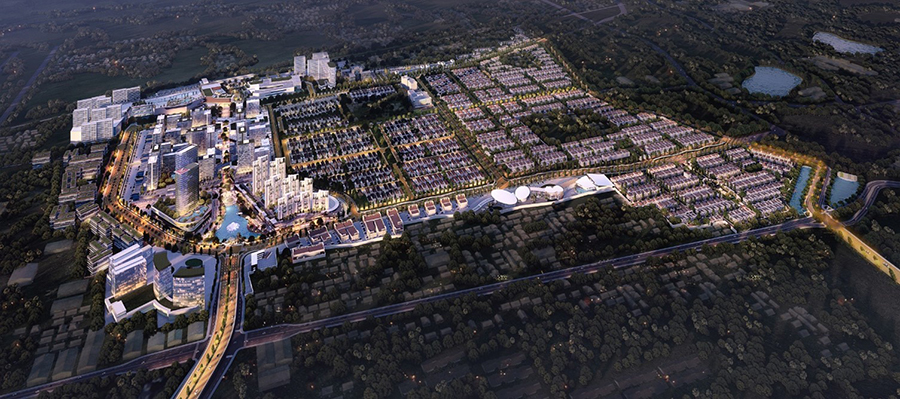
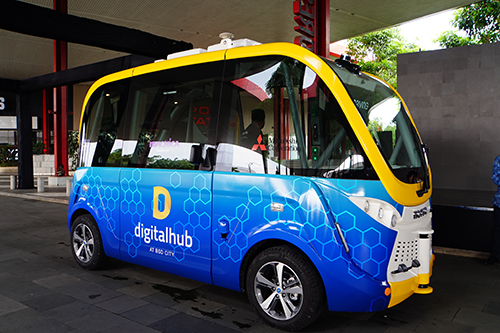
In December 2019, MC concluded a capital and business partnership with HERE International B.V. (HERE*HERE is a global leading location data and service provider with over 6,000 employees in 52 countries. The Company has a strong presence in the automotive industry, and also works with leading companies across a wide range of industries, including transport and logistics, mobility, manufacturing and retail and the public sector.*), and in May 2020, MC invested 15% in HERE. Through HERE, MC provides solutions to the automotive industry and a wide range of other industries, promoting digital transformation, and solving social issues.
Our specific initiatives with HERE are as follows.
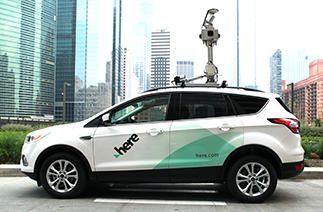

Since its establishment in 1968, MCʼs wholly owned subsidiary Mitsubishi Development Pty Ltd (MDP) has conducted mining operations in Australia, while actively undertaking community-based activities. MDP’s 50% owned BMA metallurgical coal business in Queensland, supports local communities in and around BMAʼs core operations through the Local Buying Program. The program was established to connect local and Indigenous businesses to work opportunities, and in FY24*Australian Financial Year ended June 2024* created over 9,000 goods and service opportunities (job creation), which resulted in over A$140 million being spent with over 600 local and Indigenous suppliers.
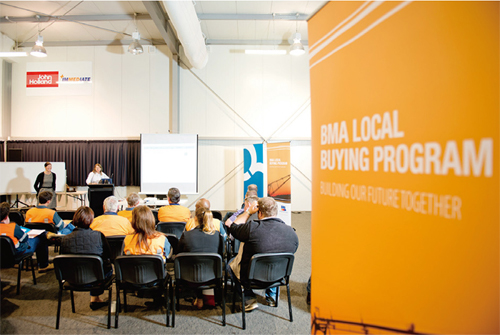
When closing mines, the operators of MC’s jointly owned mines develop responsible mine closure plans that take into account social and environmental factors. While complying with laws and regulations, MC and mine operators strive to minimize the impact on the environment and society by communicating with governments and local residents, developing appropriate mine closure plans, and implementing necessary rehabilitation measures.
Together with mining company Anglo American plc, MC owns Anglo American Quellaveco (MC’s affiliate), which operates Quellaveco copper mine in the Republic of Peru.
For 18 months since 2011, Quellaveco had engaged in dialogue with local stakeholders. As a result, 26 specific commitments were agreed in three areas of water management, environmental care and social investment. Based on these commitments, which were based on the opinions of local stakeholders, Quellaveco is engaged in various community contribution activities.
To ensure that Quellaveco’s operation does not have a negative impact on the water supply in our host communities, Quellaveco mainly uses water for mining operations from a river that is unsuitable for human consumption or agricultural use. Moquegua Region in southern Peru, where Quellaveco is located, has suffered from drought during the dry season. By supplying water stored in a dam built by Quellaveco during the dry season, Quellaveco contributes to improving the lives of local stakeholders.

Coexistence with the natural environment is one of Quellaveco’s key values. Environmental care measures are incorporated into the operation plans, such as the protection of wildlife feeding areas and habitats, the transplantation and cultivation of plants, the dust control through road maintenance and water sprinkling, and the recycling of all contact water within the Quellaveco site. The effects of these measures are constantly monitored and environmental surveys are held periodically with the participation of local stakeholders, providing opportunities to see that the natural environment of their homeland is being protected.
More than 30,000 jobs were created at Quellaveco during the development work that began in 2018, and approximately 4,500 jobs are expected to be created during the operational stage that began in July 2022. Furthermore, in order to provide as many job opportunities as possible to the local stakeholders, Quellaveco actively offers vocational training for people aspiring to acquire the various skills required in mine development and operations, as well as internships for local students. Focus is also placed on creating employment opportunities for women, and vocational training programs are conducted specifically for women. In addition, to help the promotion of local industries, Quellaveco prioritizes local businesses when procuring goods and services necessary for mine development and operations, and also promotes the development of agriculture and local industries through the “Quellaveco Fund,” launched in 2011.
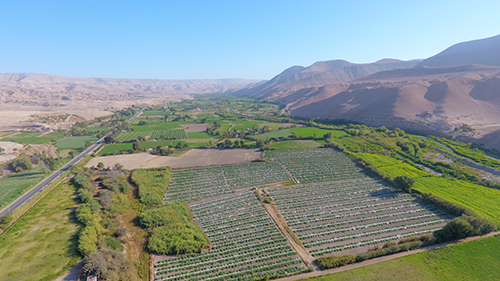
Quellaveco also launched various emergency relief measures in response to the outbreak of COVID-19. Quellaveco quickly procured and delivered supplies such as masks, protective equipment, and COVID-19 testing kits to local communities and provided ambulances, medical oxygen plants and intensive care facilities to support medical institutions dealing with the rapid increase in the number of infected people.
In Moquegua, Quellaveco has taken the lead in supporting the development of the region. In 2021, Anglo American, the International Finance Corporation (IFC, member of the World Bank Group), the Regional Government of Moquegua, MC, and M.C. Inversiones Peru (MC wholly-owned subsidiary in Peru) jointly launched “Moquegua Crece” ( “Moquegua Grows”), an innovative public–private initiative to promote sustainable socio-economic development across the region. Various stakeholders in Moquegua, including the private sector, NGOs, local communities, and the government, are working together toward the goal of long-term and inclusive development of local society. Specifically, the initiative aims at fostering coordinated action to implement sustainable regional development initiatives that can maximize the potential of the Moquegua region by supporting the planning, implementation, and monitoring of regional public development projects; developing local industries; and sustainable management and use of water and other natural resources. In 2023, this initiative started supporting the formulation of a long-term development plan for the Regional Government of Moquegua to strengthen the public investment process and improve services and infrastructure for communities in the region.
In Moquegua, Quellaveco has taken the lead in supporting the development of the region. In 2021, Anglo American, the International Finance Corporation (IFC, member of the World Bank Group), the Regional Government of Moquegua, MC, and M.C. Inversiones Peru (MC wholly-owned subsidiary in Peru) jointly launched “Moquegua Crece” (Spanish for “Development of Moquegua”), an innovative public–private initiative to promote sustainable socio-economic development across the region. Various stakeholders in Moquegua, including the private sector, NGOs, local communities, and the government, are working together toward the goal of long-term and inclusive development of local society. Specifically, the initiative aims at fostering coordinated action to implement sustainable regional development initiatives that can maximize the potential of the Moquegua region by supporting the planning, implementation, and monitoring of regional public development projects; developing local industries; and sustainable management and use of water and other natual resources. In 2023, this initiative started supporting the formulation of a long-term development plan for the Regional Government of Moquegua to strengthen the public investment process and improve services and infrastructure for communities in the region.
Cape Flattery Silica Mines Pty, Ltd. (CFSM), a wholly owned subsidiary of MC, is located in Queensland, Australia, and has supplied silica sand to users in East Asia and Southeast Asia for over 50 years, since its establishment in 1967. Currently one of the world’s largest silica mines, CFSM ships approximately 3 million tons of silica sand annually to glassmakers and other customers.

1. Coexisting with traditional owners
The land where CFSM operates is owned by traditional owners. Accordingly, besides compensation, CFSM also prioritizes employment from the local communities, offers to pay for vocational training and apprenticeships, offers funding support to local community infrastructure, and conducts other initiatives in order to coexist with the local communities. Out of CFSM's roughly 100 employees, indigenous people make up one third.
2. Coexisting with nature
CFSM restores vegetation to former mining areas, with some employees devoted to rehabilitation activities, returning these areas to their original states. CFSM collects seeds from plants that grow naturally in the area and then plants and raises them in a designated nursery. After the mining is completed, the plants are planted back in the mining area. By spending 3-4 years to restore the site to its original vegetation levels, CFSM is able to coexist with the natural environment.

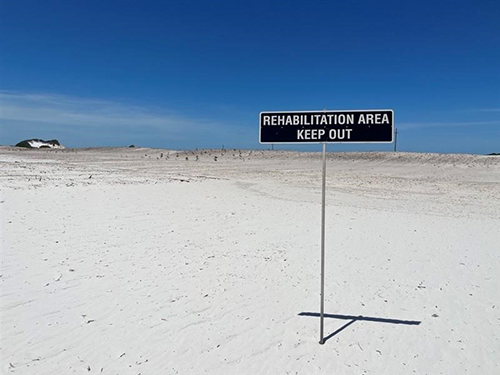
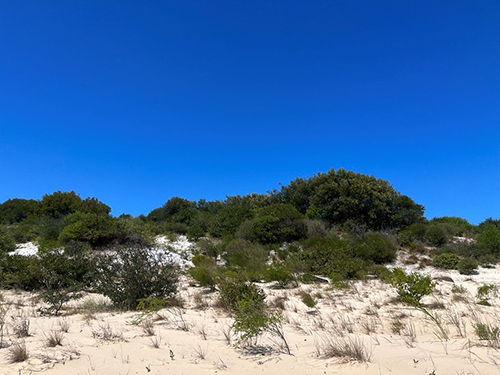
The main applications for silica sand include glass, foundries, and chemicals. However, with environmental issues gaining attention worldwide, CFSM is also responding to market needs by increasing the supply of materials to solar panel glass producers. Going forward, CFSM will continue supporting the proliferation of clean energy by supplying their materials, while taking advantage of its sustainable environment-friendly operations and stable quality and volume of product.
Please check the link below for data on Donation Amounts.

